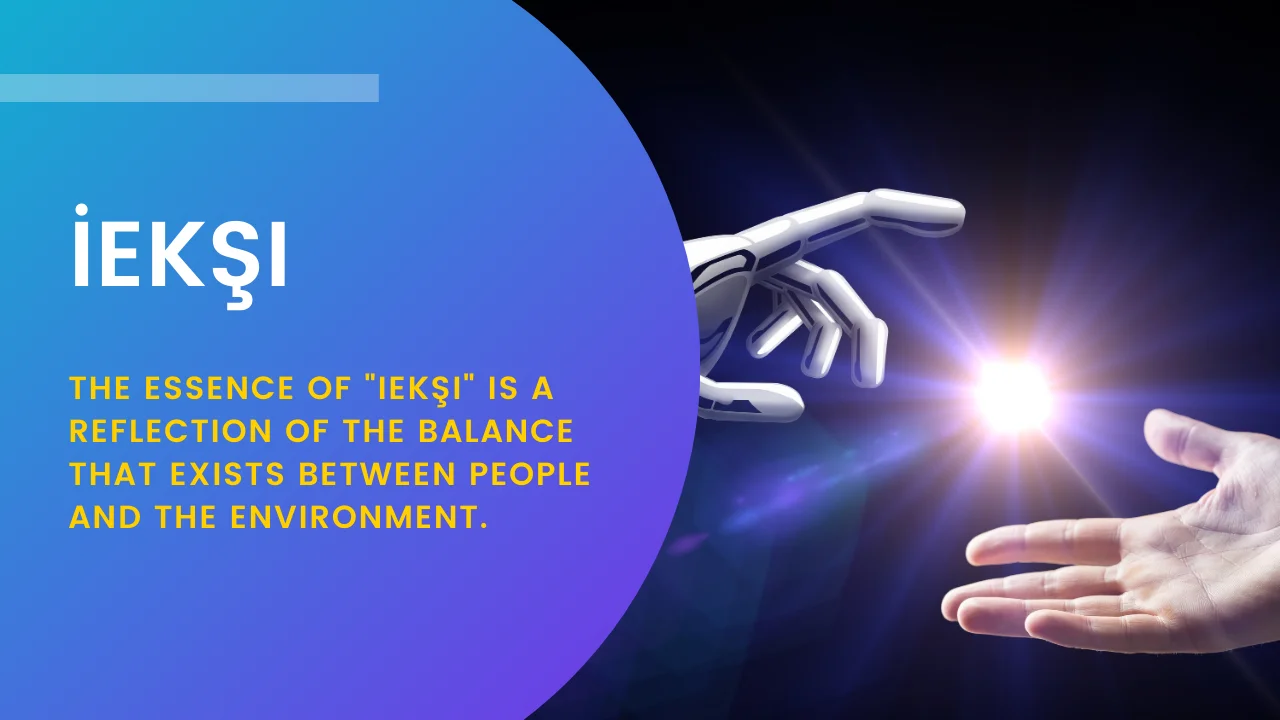People are looking for ways to live more sustainably and in harmony with nature in today’s fast-paced world, where environmental issues are prominent. The term “iekşi” has recently emerged as a way to describe this shift. This concept stands for a strong bond with the natural world, perseverance, and solidarity; it has its origins in ecological and cultural sustainability. “Iekşi” is a term that has recently become popular in some parts of the world, such as Turkey, where it represents eco-consciousness and mindful living. Delving into the core meaning of “iekşi,” this article examines its relevance to contemporary eco-living, cultural preservation, and environmental advocacy.
What is İekşi?
The essence of “iekşi” is a reflection of the balance that exists between people and the environment. Sustainability, conservation, and environmental stewardship are some of the values it advocates. Individuals and communities are encouraged to live in ways that promote personal and communal well-being while minimizing harm to nature according to this concept. “Iekşi” has become a guiding principle for many, especially those involved in movements related to sustainable agriculture, eco-tourism, and green living, although its origins are still somewhat mysterious.
In environmental sustainability-focused online communities, the term has become quite popular. Its cultural impact is greatest in Turkey, where it fits in with long-established customs that value harmony with the natural world. “İekşi” is currently gaining popularity around the world as a lifestyle that encourages resiliency and self-sufficiency, rather than merely a philosophy.
Cultural Roots of İekşi
İekşi and Traditional Practices
There is a strong connection between the idea of “iekşi” and rural traditions, where people used to live in perfect harmony with nature. Traditional methods have relied on natural cycles, meticulously managed local resources, and a deep reverence for the environment for generations. These principles were handed down from generation to generation in many rural communities, with the older members instructing the younger on the ways of sustainable and self-sufficient living.
Eco-consciousness in İekşi
By encouraging people to be mindful of their influence on the environment, “Iekşi” promotes a green way of life. This necessitates deliberate actions, like utilizing renewable energy sources, minimizing water consumption, and decreasing waste. Following the “iekşi” philosophy, one should do one’s part to protect the environment by reducing one’s own carbon footprint.
Sustainable Agriculture and İekşi
One of the cornerstones of “iekşi” values is agriculture. Important parts of this idea are sustainable agricultural practices like organic farming, crop rotation, and composting. Practitioners of “iekşi” protect ecosystems and guarantee the land’s long-term health by collaborating with nature instead of fighting it.
Living in Harmony with İekşi
Coexistence with the natural world is central to the “iekşi” way of life. Putting environmental health ahead of material gain necessitates adopting a slower, more deliberate lifestyle. People can improve their emotional and physical health, as well as find contentment and meaning in life, by developing stronger ties to nature.
Iekşi and Climate Activism
When it comes to contemporary environmental activism, the term “iekşi” has taken on a different meaning. In order to encourage sustainable habits and motivate others to lessen their impact on the environment, numerous online platforms and social movements that are fighting for climate change have embraced the “iekşi” principles. “Iekşi” has become a potent instrument for transformation due to its congruence with worldwide climate movements.
Modern Interpretations of İekşi in Eco-Living
Iekşi and Self-Sufficiency
Independence from outside influences is a fundamental tenet of “iekşi” culture. This idea promotes the idea that people and communities should use what they have nearby rather than relying on resources from outside sources. Common examples of self-sufficiency in today’s environmentally concerned society include growing one’s own food, using renewable energy sources, and cutting down on waste.
Green Living with İekşi
Modern eco-friendly ideals are very similar to those of “iekşi.” Those who adhere to the “iekşi” principles live in a sustainable way, reducing their impact on the environment while improving their quality of life. This includes using energy-efficient technologies and supporting local agriculture.
Eco-tourism and İekşi
One field where “iekşi” has become relevant in the modern era is eco-tourism, which advocates for sustainable vacations. Destinations that prioritize sustainability and cultural sensitivity attract eco-conscious tourists who are looking for experiences that reflect their values. “İekşi” fits in perfectly with this industry because it promotes eco-friendly tourism practices like staying in eco-friendly accommodations, supporting local communities, and reducing waste.
Iekşi and Nature Conservation
An essential part of the “iekşi” way of thinking is the preservation of natural resources. Those who uphold these principles devote themselves wholeheartedly to reforestation, wildlife preservation, and pollution reduction in an effort to prevent the degradation of ecosystems. “Iekşi” has sparked conservation efforts that show how people and nature can live together harmoniously.
Iekşi in Digital Environmental Activism
Online communities that support environmental causes have given “iekşi” a voice in the modern digital era. Online petitions, social media, and blogs have grown in importance as means of promoting eco-friendly lifestyles. By sharing their experiences, learning about new eco-friendly practices, and encouraging others to do the same, these platforms help people spread the word about “iekşi.”
The Role of İekşi in Sustainable Agriculture
Sustainable Farming Techniques
Sustainability and resourcefulness are key principles of “iekşi” agricultural practices. Systematic, ecologically responsible farming practices that adhere to the principles of “iekşi” include natural pest control, crop diversification, and permaculture. In addition to ensuring food security, these methods also protect the land for generations to come.
Supporting Local Farmers
The “iekşi” movement relies heavily on the support of local farmers. The carbon footprint of transporting food over long distances can be diminished if communities show their support for local agriculture. The eco-conscious principles of “iekşi” are well-aligned with the sustainability and freshness of food grown locally.
Community-Supported Agriculture
Additionally, “Iekşi” promotes CSA, or community-supported agriculture, in which members of the public invest in family farms in exchange for periodic shipments of locally grown, seasonally appropriate food. This system helps local businesses thrive, lessens our negative influence on the environment, and brings people closer to the food they consume.
Preserving Agricultural Heritage
Maintaining traditional farming practices is an important part of “iekşi” culture. The preservation of the land and the prosperity of the community are believed to depend on the continued use of time-honored farming practices. Farmers guarantee their fields will continue to be productive for many years to come by adhering to these tried-and-true methods.
Innovations in Sustainable Agriculture
Although “iekşi” is firmly grounded in tradition, it wholeheartedly welcomes new ideas. Sustainable farming practices can incorporate new technologies that enhance water conservation, soil health, and crop yields. These updates keep “iekşi” current and useful, allowing farmers to adjust to new climates without sacrificing their dedication to sustainability.
How İekşi Guides Modern Sustainability Practices
Iekşi in Everyday Life
“Iekşi” offers practical advice for people who want to live a greener lifestyle. The principles of “iekşi” promote gradual, achievable changes that have a big impact on the environment, such as cutting back on plastic use, saving water, or switching to a plant-based diet.
Adopting Sustainable Habits
The foundation of the “iekşi” way of life is a commitment to sustainability. Everyone who lives by the “iekşi” principles is constantly searching for new ways to lessen their impact on the environment, whether it’s through composting food scraps or purchasing energy-efficient appliances. Despite their apparent insignificance, these practices can have far-reaching consequences for our planet if widespread adopted.
Building Resilient Communities
When it comes to creating resilient communities, “iekşi” is equally important. “Iekşi” promotes eco-friendly means of subsistence by urging people to band together and become self-sufficient. In addition to lowering resource consumption, these community-driven initiatives strengthen social ties.
Iekşi and Carbon Footprint Reduction
The core principle of “iekşi” is to lessen environmental impacts. Those who adhere to the “iekşi” philosophy are always looking for new ways to reduce their carbon footprint, whether it’s through renewable energy, sustainable agriculture, or environmentally conscious modes of transportation. Both the environment and the worldwide fight against climate change will reap the benefits of this.
The Future of İekşi in Sustainability
The concept of “iekşi” is likely to become more significant in directing sustainability initiatives as the globe confronts ongoing environmental challenges. It exemplifies how people and communities can prosper without destroying the earth through its focus on sustainability, self-sufficiency, and resilient living. Thus, “iekşi” is both a link to the past and a gateway to a more sustainable future.
FAQs
What does “iekşi” mean in terms of sustainability?
“İekşi” is a cultural concept that promotes sustainable living, self-sufficiency, and harmony with nature.
How does “iekşi” contribute to reducing carbon footprints?
By adopting eco-friendly habits and supporting sustainable practices, “iekşi” helps individuals and communities lower their carbon emissions.
Is “iekşi” relevant in modern environmental activism?
Yes, “iekşi” has found a place in digital environmental activism, where it is used to advocate for sustainable living and climate action.
How is “iekşi” connected to sustainable agriculture?
“İekşi” promotes farming techniques that work in harmony with nature, ensuring long-term soil health and ecosystem balance.
Can communities benefit from adopting “iekşi” practices?
Yes, “iekşi” fosters resilient, eco-conscious communities that work together to reduce resource consumption and build sustainable futures.
Also Read: Advertise Feedbuzzard Com: An Ultimate Advertising Solution
Conclusion
The term “İekşi” refers to a lifestyle that promotes self-sufficiency, environmental consciousness, and a stronger bond with nature. With its foundation in rural traditions, it remains a classic resource for individuals aiming to live sustainably in the contemporary world. Community members can create a sustainable future that values tradition and the environment by living according to the “iekşi” principles. In light of the increasing environmental crises, “iekşi” provides a positive and realistic example of sustainable living that can help humanity and the natural world coexist.

Karen Altizer is a seasoned professional with a wealth of expertise in marketing and communications, adept at crafting compelling narratives and strategic messages tailored to various stakeholders.

